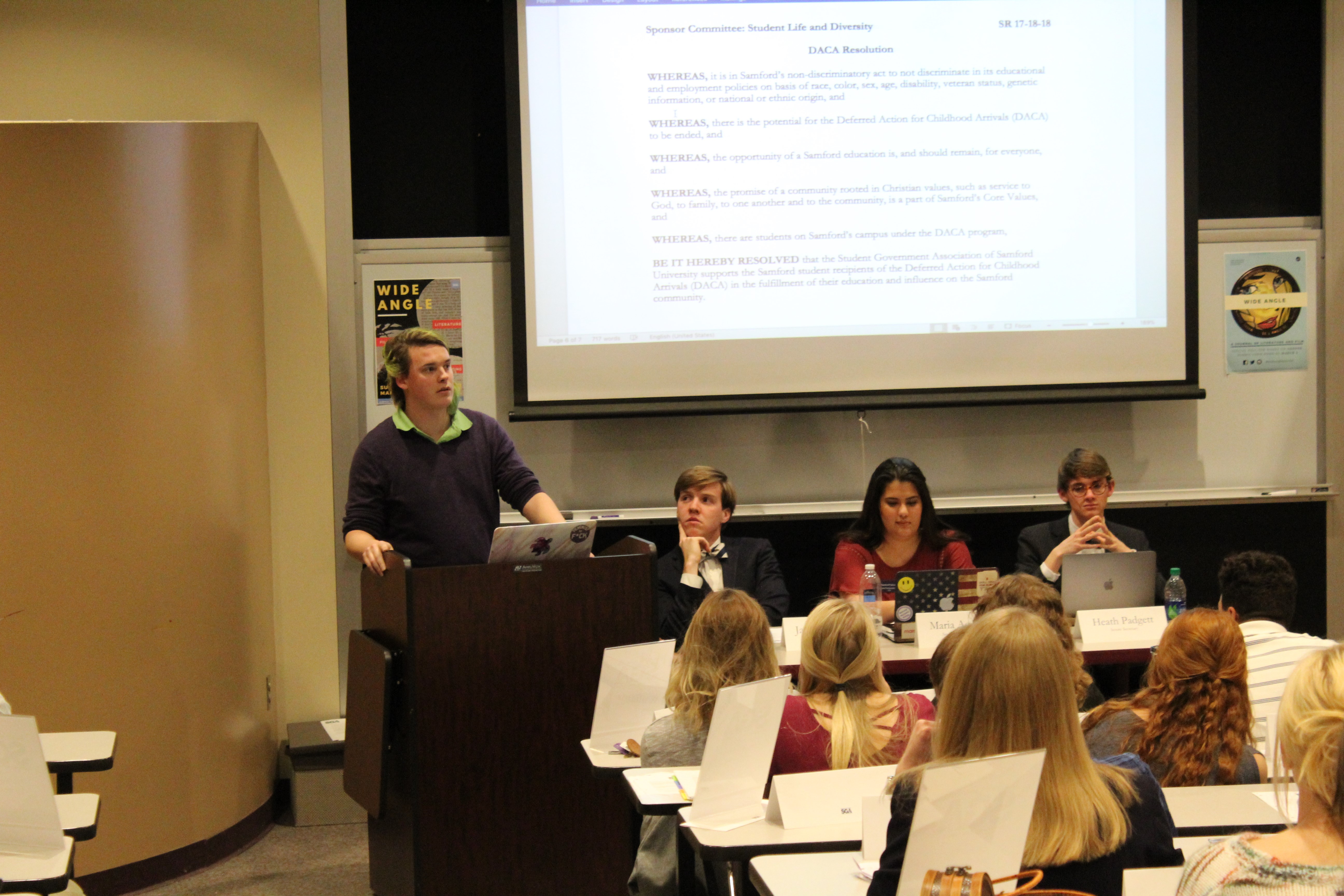Samford University’s Student Senate on Tuesday March 6, 2018 passed a resolution supporting Samford’s DACA students.
According to the Pew Research Center, the Deferred Action for Childhood Arrivals program or DACA protects 790,000 undocumented children from deportation. However, DACA expired on March 5.
Sen. Isaac Sours said he believes SGA should help these students complete their education even if they lose their residency status.
Sours said the resolution wouldn’t endorse the DACA policy and only protects currently enrolled DACA receipts. Sours said he wants President Andrew Westmoreland to publicly assure DACA students they will be able stay at Samford. Sours suggested Samford create sponsor families for these students.
“They’re our fellow students, and they should have the same opportunities. The only way they should leave is with a diploma like the rest of us,” he said.
However, Sen. Mitchell Whitley said senate should avoid national politics. Whitley said his fellow senators political biases may have swayed votes.
Rather than SGA, Whitley said Samford’s Latino Student Organization and other student organizations should lead this discussion.
“I think it’s important Samford supports all its students, but my main issue is the controversy it creates. It’s a political statement,” Whitley said. Whitley said universities’ biases could also distort the debate. According to The Atlantic, 600 universities wrote letters to President Trump supporting their DACA students.
Whitley said students should drive the debate and suggested SGA host town halls or create polls.
“With something so controversial, we should get students involved. Universities have students that lean both left and right, and they shouldn’t be leaning a certain way,” he said. Whitley said Samford can’t protect DACA students without violating federal law.Ultimately, Whitley said Congress should address DACA.
“Samford should stay neutral. We shouldn’t try to solve this issue ourselves,” he said. “We’re not as qualified as politicians. They’re experts in this field.”
Whitley said he also fears this resolution could create tension among students and DACA students could face harassment.
However, Sours said DACA students usually face harassment due to their race or ethnicity and not their citizenship status.
Sours said harassment is a problem across campus, including among Samford’s LGBTQ community.
“I was shocked by the number of cases reported to me,” he said.
Nevertheless, Sours said senators must represent all students.
“Letting harm befall DACA students would be a waste of our responsibilities. They don’t have as loud of a voice as other students,” he said.
Sours said the resolution only focuses on education.
“Take away the politics and introduce the humanity and emphasis on education, then it’s not a problem,” he said.
Sours said DACA students’ culture and heritage enhances Samford student’s education.
“They have a hyberized worldview and experiences that we could all benefit from,” he said.
For example, Sours referenced Samford alumni and DACA receipt Fernanda Herrera-Vera’s campus involvement and accomplishments. Herrera-Vera interned in Congress and founded Samford’s Latino Student Organization.
“She was a model student. If she had been deported, we would have lost a great student,” he said.
Sours said a diverse student body helps prepare students for adulthood.
“When you leave Samford, you’re going to leave the bubble. It’s going to pop,” he said. “This country is more diverse than this university. The more you come into contact with people different than you here, the better you’re going to able to handle those differences outside this bubble.”
Alongside education, Sours said Samford’s Christian mission also aligns with this resolution.
“We’re taught to love our neighbors as ourselves. Jesus didn’t discriminate and didn’t care about someone’s legal status,” he said.
Herrera-Vera said DACA receipts deserve humane treatment. Herrera-Vera said she believes students should lead this discussion because change looks different on every campus.
However, Herrera-Vera said SGA should serve a role in the DACA conversation because it impacts more than Latino students.
“DACA recipients aren’t just Latinos. Immigrants are from every country, and they are every color and ethnicity,” she said.
Secondly, Herrera-Vera said student organizations can’t propose legislation as easily as senators.
Although, for the resolution to have power, Herrera-Vera said it requires faculty and administrative support. She said support must exceed words.
“I feel it’s a conversation that has to happen, but it has to come from the students,” she said.
William Marlow, News Editor





